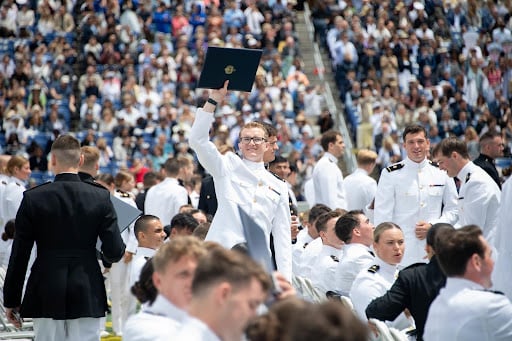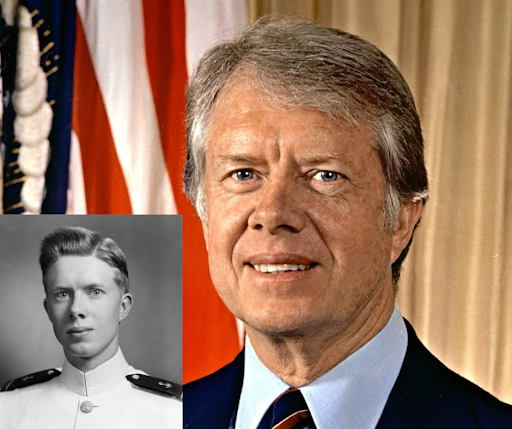Graduating from the United States Naval Academy (USNA) is more than a milestone, it’s a launchpad into a world of adventure, leadership, and service. Once you toss your cover into the air at Commissioning Week, you’re not just celebrating the end of four rigorous years. You’re stepping into one of the many exciting U.S. Navy officer careers or U.S. Marine Corps leadership roles that await. From navigating destroyers to leading Marines, from soaring in fighter jets to exploring the ocean’s depths, USNA graduates have a wide array of paths to travel. Let’s take a closer look at what lies ahead.
Your Service Commitment Begins
Upon graduation, midshipmen are commissioned as either ensigns in the Navy or second lieutenants in the Marine Corps. Nearly all graduates begin in the “unrestricted line” of service. This includes core Navy officer jobs such as surface warfare, submarine warfare, naval aviation, and Marine Corps officer assignments. A smaller number of graduates pursue restricted line or staff corps specialties - areas like the Supply Corps, Civil Engineer Corps, or Medical Service Corps. These options are limited but essential, offering unique opportunities for those drawn to technical or medical service.
Surface Warfare
If you thrive in fast-paced environments and enjoy problem-solving on the fly, surface warfare might be for you. Surface Warfare Officers (SWOs) serve aboard a variety of ships, from guided missile destroyers to amphibious vessels. Once commissioned, you’ll serve as a division officer for about 24 months, leading a team of 12–50 sailors. Whether you’re managing anti-submarine warfare operations or ensuring seamless communications, this role provides hands-on leadership from day one. It’s the kind of Navy officer career where you’ll learn quickly and leave a lasting impact on your crew.
Submarine Warfare
For those intrigued by the ocean’s mysteries, submarine warfare offers unmatched challenges and opportunities. Becoming a submarine officer means a rigorous training pipeline. You’ll start with six months of training at the Nuclear Power School, move on to a reactor prototype site for six months of hands-on experience, and finish at the Navy Submarine School in New London, Connecticut, for the ten-week Submarine Officers Basic Course. Once aboard, you’ll lead divisions in engineering or weapons while working toward the coveted gold Dolphins pin - your badge of honor as a qualified submarine officer.
Naval Aviation
If the skies call to you, naval aviation might be your ticket. The preparation here is rigorous too; Navy pilots and Naval Flight Officers (NFOs) train extensively before ever touching their assigned aircraft. From Pensacola’s Air Indoctrination Course to advanced flight training, you’ll be pushed to your limits. The payoff? You could find yourself landing an F/A-18 Hornet on a carrier deck or piloting a P-8A Poseidon for maritime surveillance. Training includes a six-week air indoctrination course at Naval Aviation Schools Command in Pensacola, Florida, followed by primary flight training, advanced naval flight training, and training for your specific aircraft. In addition to flying, aviators take on leadership roles in their squadrons, ensuring their teams are mission-ready at all times.
The Marine Corps
Up to a quarter of each USNA graduating class heads into the Marine Corps. After graduation, Marine second lieutenants attend The Basic School (TBS) in Quantico, Virginia, where they train in leadership and land warfare tactics. From there, officers move into their occupational specialty - infantry and armor, aviation, logistics, and more. Marines are known for their grit, adaptability, and endurance. As a new Marine officer, you’ll often lead a platoon, making split-second critical decisions in high-stakes environments.
Related: Becoming a Marine Corps Officer Through the Naval Academy
Naval Special Warfare
For the few who crave the ultimate test, there’s Naval Special Warfare. As a globally respected elite fighting force, SEAL (Sea, Air, and Land) officers undergo some of the toughest training on the planet before deploying around the world on missions of extraordinary importance - from ships, submarines, and aircraft. This is a Navy officer job unlike any other, reserved for those who are physically and mentally prepared to serve on the front lines of national security.
Related: Service Assignment Spotlight: Navy EOD Officer
Restricted Line and Staff Corps Roles
Not every path involves combat duty. Restricted line and staff corps officers contribute expertise in intelligence, information warfare, civil engineering, and medicine. From cybersecurity to civil engineering, many of these specialties translate directly into some of the best careers available after military service.
Looking Ahead
Your first assignment is just the beginning of an exciting journey. As your career develops, you’ll have access to graduate education, advanced technical training, and leadership opportunities that prepare you further for command. Many Navy officer careers pave the way for rewarding futures even beyond military service. Whether you dream of commanding a ship, flying combat missions, or leading Marines, the skills you gain - discipline, leadership, and problem-solving - are exactly what employers covet in the civilian sector.
Supporting the Futures of Midshipmen
Of course, none of this is possible without the hard work and dedication of today’s midshipmen. They’re honing their leadership, maritime, and physical skills every day to become tomorrow’s officers. When you take a Naval Academy tour, shop at the USNA Gift Shop (or online at Navyonline.com), or dine on the Yard, you’re supporting their extraordinary journey. These funds fuel extracurricular activities like theater, music, cultural arts, and club sports, giving midshipmen the skills and the bonds to grow as leaders and teammates.
The Adventure Awaits!
Graduation from the Naval Academy is the start of an incredible story. Whether you’re drawn to ships, submarines, aircraft, or the battlefield ashore, Navy officer jobs and Marine Corps assignments offer unparalleled opportunities for growth, service, and adventure.
The mission begins right here at the Naval Academy, and the future’s full of boundless possibility.
-1.png)









